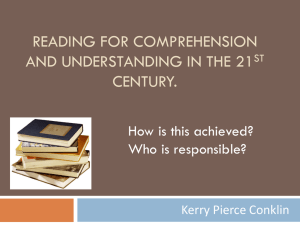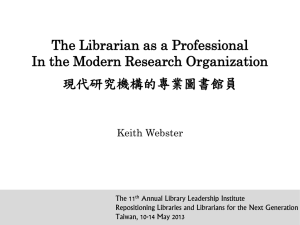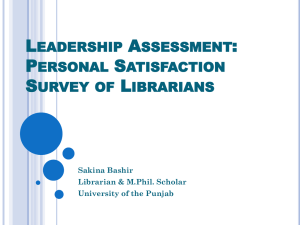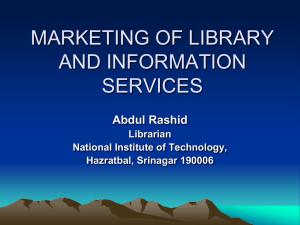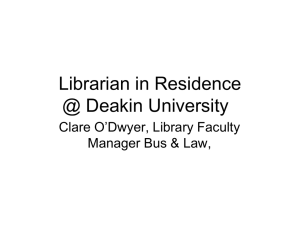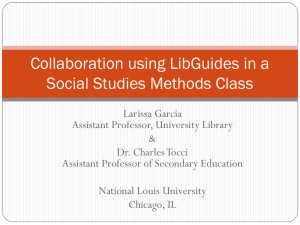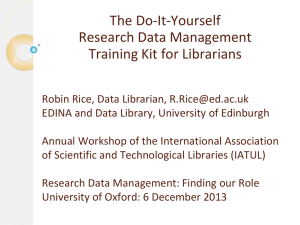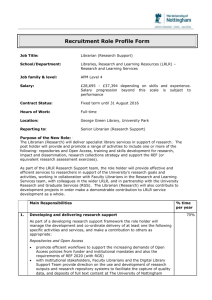PPT - Cambridge University Library
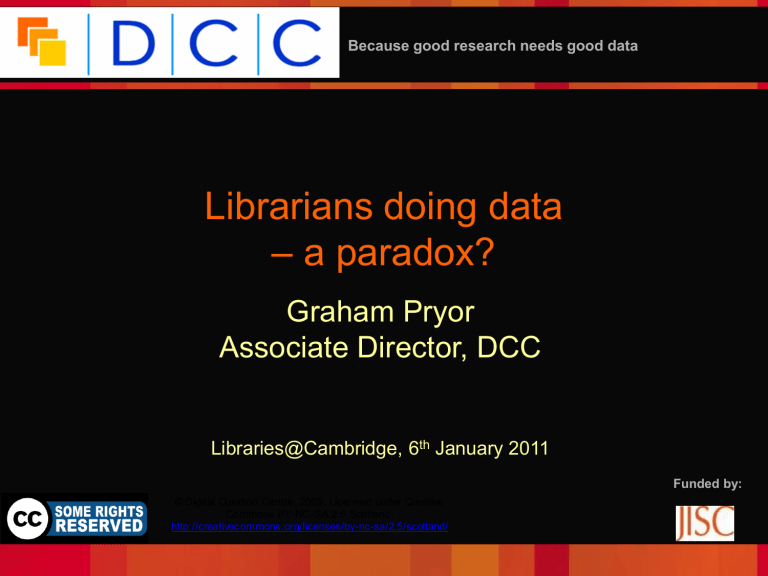
Because good research needs good data
Librarians doing data
– a paradox?
Graham Pryor
Associate Director, DCC
Libraries@Cambridge, 6 th January 2011
© Digital Curation Centre, 2009. Licensed under Creative
Commons BY-NC-SA 2.5 Scotland: http://creativec ommons.org/licenses/by-nc-sa/2.5/scotland/
Funded by:
The Doomsday Scenario
In 1979 Dennis Lewis, head of ASLIB, wrote what came to be known as the Doomsday Scenario for librarians
• This was a time when only basic online information services were beginning to take off
• Lewis said that information professionals wouldn't be around by the year 2000
• Meaning that the types of information professionals he saw working in 1979 (mainly librarians and information scientists) would be long gone
• In 1979, with ubiquitous IT services still some way over the horizon, there was a sense that the information age could instead belong to computing scientists, who in turn might enable users to do it all for themselves
What is a librarian?
Cardinal Tommaso
Inghirami, Librarian to
Pope Leo X – Raphael,
1515-16, Galleria Palatina
(Palazzo Pitti), Florence
Jeff Haywood, Vice
Principal Knowledge
Management, Chief
Information Officer &
Librarian, University of
Edinburgh
What is a librarian?
Cardinal Tommaso
Inghirami, Librarian to
Pope Leo X – Raphael,
1515-16, Galleria Palatina
(Palazzo Pitti), Florence
Jeff Haywood, Vice
Principal Knowledge
Management, Chief
Information Officer &
Librarian, University of
Edinburgh
What is a librarian?
For centuries the custodian of documented knowledge , the librarian has traditionally been the recognised exponent of skills in
• classifying and organising,
• appraising, selecting, annotating,
• preserving, storing and retrieving,
• distributing, sharing and
• managing access to information
What is data?
First of all – what is information but data that has been contextualised in order to impart a message and what is knowledge but what we understand about a subject from the available information
And data ?
The lowest level of abstraction in the field of knowledge
Collections of numbers, characters, images or other symbols that when contextualised in a certain way represent facts, figures or ideas
Yet information and knowledge can be communicated to another person only after they are encoded as data
What is data?
First of all – what is information but data that has been contextualised in order to impart a message and what is knowledge but what we understand about a subject from the available information
And data ?
• The lowest level of abstraction in the field of knowledge
• Collections of numbers, characters, images or other symbols that when contextualised in a certain way represent facts, figures or ideas
• Yet in the digital age information and knowledge can be communicated to another person only after they are encoded as data
So what is research data?
• Data that is generated within the context of systematic investigation
• The collected and recorded primary output from a process of observation, experiment or the testing of a hypothesis
• The principal output from scholarly research that when assembled in context and interpreted expertly will produce new knowledge
As an aside the ‘principal output’?
Scholarly publications – the tip of visible research output
Research data – the hidden asset
(just quietly melting away?)
So…
• If data plus context produces information
• If information properly recorded, represented and understood enables knowledge
• If librarians are the skilled custodians and purveyors of knowledge
• Why, apparently, don’t librarians do data?
• Bearing in mind, of course, that data (hence information) is, in the 21 st century, mainly digitally produced and recorded
Is that the problem?
A black hole?
Computing scientists don’t ‘do data’ either.
• They provide and maintain infrastructure for data
• They enable data storage
• They sustain transport mechanisms for data
• They devise software for the manipulation of data
But they don’t ‘do data’ – i.e. they don’t
• Organise, appraise, preserve or curate data
So who does – the data producers?
Incremental Project Scoping Study of
Researcher Practice, July 2010
• Creation and organisation of data
• Inconsistent file structures, naming conventions, etc.
• Researchers cannot find even their own data
• Data storage and access
• Many critical research data stored at risk on cheap media with minimal documentation and off network
• Data back-up
• Data sticks, laptops et al, with few guidelines used
• Preservation of research data – keep it all but…
• Uncertainty about formats, media and protocols
• Data sharing and re-use – good concept, but…
• No time for preparation, annotation, contextualising
Researchers and librarians
Patterns of information use and exchange, DCC/RIN, 2009:
• For researchers, data curation is a minor element of the research lifecycle
• Compliance with data management plans is not policed
• The traditional role of professional information intermediaries has been largely replaced by direct access to online resources
• Many researchers have removed themselves from the mainstream library user population
• Substantial discipline knowledge is required of data curators
• Where discipline knowledge is supplied, retention of skills/knowledge is not (
Helen Parkinson on data scientists at EBI
)
Edinburgh University Data Library
• FINDING…
“I need to analyse some data for a project but all I can find are published tables and graphs, not the original data source”
• ACCESSING…
“I’ve found the data I need but I’m not sure how to gain access to it”
• USING…
“I’ve got the data I need but I’m having trouble analysing it in my chosen software!”
• MANAGING…
“I’ve collected my own data and I’d like to document and preserve it and make it available to others”
Robin Rice, Data Librarian
Role of libraries
• Training researchers to be more data-aware
• Adopting a data care role via repositories (DISC-
UK DataShare project)
• Anticipating increased level of data-related interactional learning and activity between library and research communities
• Data librarians need to be trained on top of discipline background but have no career path yet
Key Perspectives Ltd http://www.jisc.ac.uk/publications/publications/dataskillscareersfinalreport.aspx
Librarians after Doomsday?
The challenge for librarians
Patterns of information use and exchange, DCC/RIN, 2009:
• Be proactive! Researchers are usually reluctant to adopt new tools and services unless they know a colleague who can recommend them
• Re-engage with the research community in a way that adds to the effectiveness of research
• Provide specialist support to facilitate the use of new tools, including professional advice, training and documentation on a discipline basis
• Don’t prescribe but recognise the researcher’s strong desire to be consulted about the re-use of data
Incremental Project action plan
Meet researchers’ demands for simple, clear, engaging, and available guidance and support by producing
• Simple, accessible, visual guidance on creating, storing, and managing data with
• web pages that point to existing local and external resources, illustrated fact sheets, flow diagrams, checklists, and FAQs with solutions to common researcher concerns
• Offer practical data training with discipline-specific examples and assisted by local champions
• Connect researchers with support staff who can offer one-toone advice and guidance from the proposal writing stage
• Facilitate the development of institutional data management by active communication, awareness raising and building of connections between service and infrastructure providers, policy makers and the research community
So what is a librarian?
Yes, ok, as we’ve seen, someone with skills in
• classifying and organising,
• appraising, selecting, annotating,
• preserving, storing and retrieving,
• distributing, sharing and
• managing access to information
But …
So what is a librarian?
• In a 2009 study of academic librarians, participants were asked to rate the importance of their skills and knowledge on a 5-point scale
• The five highest ranked choices were
• communication and interpersonal skills ( 4.60
)
• project management/leadership skills ( 4.56
)
• understanding of digital library architecture and software
( 4.52
)
• knowledge of the needs of users ( 4.42
)
• knowledge of technical and quality standards ( 4.33
)
Information Science Today, October 2009
(A traditional blend of skills, moderately revised for 2010)
Retooling at the University of Virginia
Faced with shrinking budgets and staffs, institutions may attempt to repurpose existing staff to support researchers and their data services needs (Salo, 2010).
Roles in the Model
• Scientific Data Consultants : Work with subject librarians to assess maturity of researcher’s data management practices, make recommendations for how to improve, and shepherd process improvement. Necessary skills: data management, metadata production, data organization/preservation, and systems analysis/design.
• Subject Librarians : Serve as subject matter experts and provide opportunities for the scientific data consultants to work with researchers and graduate students. Necessary skills: collaborative, ability to build partnerships, communication, content expertise.
University of Minnesota
There are probably better ways [of managing data]. If there were a workshop on organization and file management, I would go. The
Libraries do this so well – Faculty Staff, College of Biological Sciences
• Face-to-face workshops and consultations
• Introduction to Data Management
• Practical Data Management Problems
• Campus and other Data Storage Options
• Creating a Data Management Plan for Grant Applications
• One-on-one data sharing consultation
• Online resources and tools
University of Minnesota online resources
Help is at hand!
e.g. Data Audit & Assessment………..
Prioritisation of resources
Capacity development and planning
Efficiency savings – move data to more costeffective storage
Manage risks associated with data loss
Realise value through improved access & re-use
Scale: research teams, departments, institutions
Research Data
Management
Forum
DCC
Roadshows
International
Conference
DCC Events
Targeted at data managers, practitioners
Effecting institutional change in data management
Forum for research in data curation
DCC Helpdesk
• info@dcc.ac.uk
• For answers to questions about all aspects of our work
• http://www.dcc.ac.uk/
• For news, resources, tools and much more

